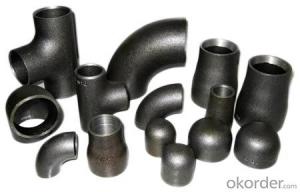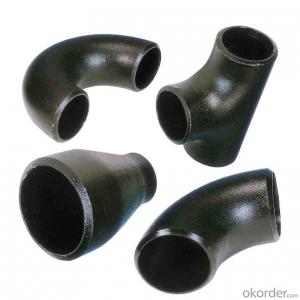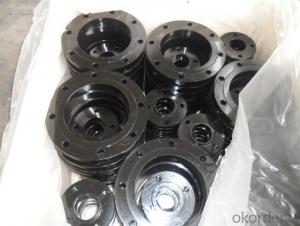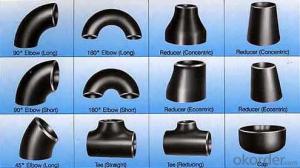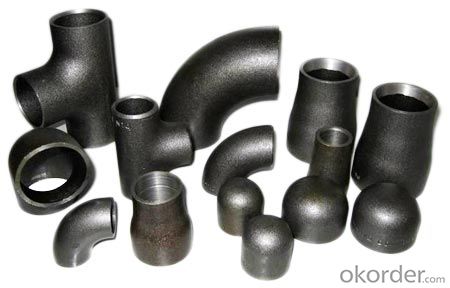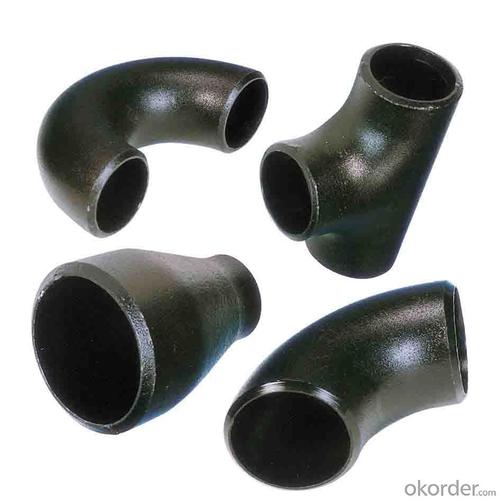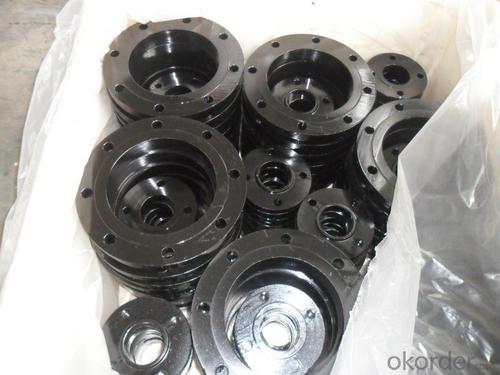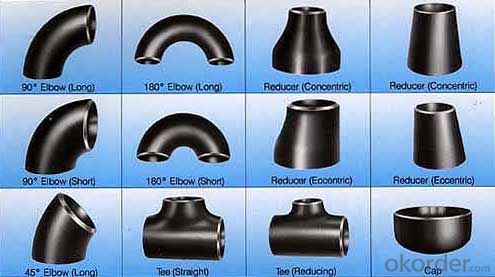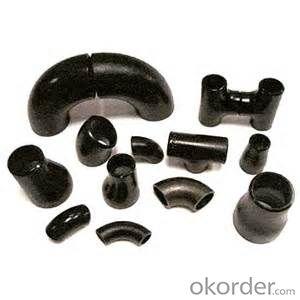CARBON STEEL PIPE FITTINGS ASTM A234 TEE 1''
- Loading Port:
- Tianjin
- Payment Terms:
- TT OR LC
- Min Order Qty:
- 5 m.t.
- Supply Capability:
- 30000 m.t./month
OKorder Service Pledge
OKorder Financial Service
You Might Also Like
Specifications
1.we produce seamless steel pipe
2.size:48-219*4.5-45mm
3.ISO 9000 approved
4.Market:south/east Asia,Mid-east,South America
seamless steel pipe
Material J55 K55 N80 L80 P110.etc
Standard ASTM JIS
Usage conveying oil gas ,oil pipe line,pipe material collar,oil nature gas,
Packing wooden cases or wooden pallet ,export standard package
Others:Special design available according to requirement
Anti-corrosion available and high temperature resistence
Delivery time 30days
Payment term T/T L/C
Name | API oil casing pipe | ||||
Out Diameter | Wall thickness | Material | Thread | Length | |
in | mm | ||||
5 1/2 | 139.7mm | 6.20 | J55/K55/N80 | LTC/STC/BTC | R2 |
6.98 | |||||
7.72 | |||||
9.17 | |||||
10.54 | |||||
6 5/8 | 168.28mm | 7.32 | J55/K55/N80 | LTC/STC/BTC | R2 |
8.94 | |||||
10.59 | |||||
12.06 | |||||
12.06 | |||||
8 5/8 | 219.08 | 8.94 | H40 | S/L/B | 9 5/8R2 |
J55/K55 | S/L/B | ||||
10.6 | L80 | L/B | |||
12.7 | L80 C95 | L/B | |||
14.15 | P110 | L/B | |||
9 5/8 | 244.48 | 13.84 | J55 K55 | R2 | |
15.11 | L80 | L/B | |||
10 3/4 | 273.05 | 11.43 | J55 K55 | S/B/E | R2 |
13.84 | P110 | S/B | |||
15.11 | P110 | S/B | |||
11 3/4 | 298.45 | 12.19 | J55 K55 | S/B | R2 |
10.96 | J55 K55 | S/B | |||
13 3/8 | 339.72 | 12.19 | J55 K55 L80 | S/B | R2 |
10.92 | J55 K55 | S/B | |||
13.06 | L80 | S/B | |||
Coupling and thread can be required according to customer requirment
- Q: Can steel pipes be used for chemical refineries?
- Chemical refineries can utilize steel pipes for their operations. Steel pipes are frequently employed in chemical refineries because of their exceptional strength, long-lasting nature, and resistance to corrosion. Given the harsh conditions present in a chemical refinery, including exposure to corrosive chemicals and extreme temperatures, it is necessary to employ materials that can endure such circumstances. Steel pipes possess the capability to withstand these challenges and are often preferred for their ability to securely and efficiently transport diverse fluids and gases. Furthermore, the weldability of steel pipes permits easy installation and maintenance within intricate refinery systems. All in all, steel pipes are a fitting choice for chemical refineries due to their durability, ability to resist corrosion, and compatibility with the demanding conditions encountered in this industry.
- Q: When can I use the PVC pipe and when to use the galvanized pipe?
- Galvanized pipes are generally used outside the drying environment or building blocks, and PVC is mainly used for pre embedding in walls or humid environments. If in the ceiling ceiling, below the roof, you need to use galvanized pipe, in the floor below, on the ground you need to use PVC.
- Q: Can steel pipes be used for automotive applications?
- Indeed, automotive applications do involve the utilization of steel pipes. In the automotive industry, steel pipes find frequent application in exhaust systems, fuel lines, and hydraulic systems, among other purposes. The key attributes of steel pipes, such as their remarkable strength, durability, and resistance to corrosion, render them well-suited for enduring the challenging conditions and requirements of automotive applications. Moreover, steel pipes offer the added advantage of being effortlessly shaped and welded, facilitating customization and simplified installation. All in all, steel pipes offer a dependable and economically viable solution for automotive applications.
- Q: What are the different types of threading on steel pipes?
- There are several different types of threading commonly used on steel pipes, including tapered, parallel, and buttress threading. Tapered threading is typically used for pipes that require a tight seal, as the threads gradually narrow towards the end of the pipe. Parallel threading, on the other hand, has threads that run parallel to the pipe's axis and is often used for pipes that need to be easily assembled and disassembled. Buttress threading is a combination of tapered and parallel threading, featuring one side with a tapered thread and the other side with a straight thread. This type of threading is often used for pipes that require both a secure connection and easy installation.
- Q: How are steel pipes repaired in case of damage or leaks?
- Various methods can be used to repair steel pipes in the event of damage or leaks. Welding is a common approach where a filler material is melted along with the damaged or leaking area, creating a strong bond that seals the leak. This method is effective for small to moderate-sized leaks and finds wide application in industries like oil and gas, plumbing, and construction. Another method involves the use of mechanical couplings. These couplings are designed to connect two sections of pipe securely, ensuring a tight connection. They can be utilized to repair damaged or leaking sections of a steel pipe by removing the damaged area and replacing it with a new section that is linked using the mechanical coupling. This method is particularly useful for larger leaks or damaged sections that cannot be repaired through welding. In certain cases, temporary fixes can be applied using pipe clamps or epoxy compounds. Pipe clamps are employed to seal the damaged area tightly, preventing further leakage. On the other hand, epoxy compounds are directly applied to the damaged or leaking section, creating a temporary seal that stops the leak until a more permanent repair can be carried out. It is essential to consider the severity and location of the damage or leak, as well as the specific requirements of the application, when deciding on the method of repair. In some instances, it may be necessary to replace the entire section of the steel pipe if the damage is extensive or if multiple leaks are present. It is advisable to consult a professional or a specialized pipe repair service to determine the most suitable repair method for a particular situation.
- Q: How do you calculate the pipe flow rate coefficient for steel pipes?
- To calculate the pipe flow rate coefficient for steel pipes, you need to consider various factors related to the pipe's dimensions, material properties, and the fluid flowing through it. The pipe flow rate coefficient, also known as the discharge coefficient (Cd), is a dimensionless value that represents the efficiency of fluid flow through a pipe. Here are the steps to calculate the pipe flow rate coefficient for steel pipes: 1. Determine the inside diameter (ID) of the steel pipe. This is the measurement of the internal cross-sectional area of the pipe through which the fluid flows. 2. Calculate the pipe's cross-sectional area (A) using the formula: A = π * (ID/2)^2. Here, π is the mathematical constant pi (approximately 3.14). 3. Measure the pressure drop (∆P) across the steel pipe. This is the difference in pressure between the pipe's inlet and outlet. 4. Measure the fluid flow rate (Q) through the pipe. This can be done using flow meters or by measuring the time it takes for a known volume of fluid to pass through the pipe. 5. Calculate the velocity (V) of the fluid flowing through the pipe using the formula: V = Q / A. Here, Q is the fluid flow rate and A is the cross-sectional area of the pipe. 6. Calculate the pipe flow rate coefficient (Cd) using the formula: Cd = Q / (A * √(2 * ∆P / ρ)). Here, ρ is the fluid density. This formula is derived from the Bernoulli's equation and takes into account the pressure drop, fluid flow rate, and fluid density. It is important to note that the pipe flow rate coefficient for steel pipes can vary depending on factors such as pipe roughness, fluid viscosity, and Reynolds number. Therefore, it is advisable to consult relevant engineering standards, such as the Darcy-Weisbach equation or the Hazen-Williams equation, to obtain more accurate values for specific pipe configurations and fluid properties.
- Q: Can steel pipes be used for underground water treatment systems?
- Certainly, underground water treatment systems can utilize steel pipes. Renowned for their durability, strength, and resistance to corrosion, steel pipes prove themselves suitable for a range of uses, including underground water treatment systems. They possess the ability to endure the pressure and environmental circumstances found underground, guaranteeing the secure and effective conveyance of water within the treatment system. Nevertheless, it is crucial to take into account the water quality and the likelihood of corrosion in the particular location when opting for the type of steel and implementing safeguarding measures, such as coatings or cathodic protection, to avert corrosion and ensure the pipes' longevity.
- Q: How do steel pipes handle water hammer in high-rise buildings?
- Steel pipes in high-rise buildings are designed to handle water hammer by incorporating various features. Firstly, these pipes are often equipped with pressure relief valves or surge tanks that absorb and dissipate the sudden pressure changes caused by water hammer. Additionally, engineers use techniques such as proper pipe sizing, installation of air chambers, and use of flexible connectors to minimize the effects of water hammer. These measures help to reduce the sudden pressure spikes and prevent damage to the pipes and other plumbing components in high-rise buildings.
- Q: What's the use of steel pipe?
- No other type of steel can replace the steel tube entirely, but the steel tube can take the place of some sections and bars. Steel pipe is very important to the development of national economy and the improvement of human life quality, much better than other steel products. From the people's daily utensils, furniture, water supply and drainage, gas supply, ventilation and heating facilities to all kinds of agricultural machinery equipment manufacturing, underground resources development, national defense and space use guns, bullets, missiles, rockets and so cannot do without steel.
- Q: What kinds of steel pipe are divided into?
- According to the weld shape can be divided into longitudinal welded pipe and spiral welded pipeStraight welded pipe: the production process is simple, high production efficiency, low cost, rapid developmentSpiral welded pipe: strength ratio of longitudinal welded pipe is high, with a narrow billet production of large diameter pipe, also can use the blank production of the width of the same diameter of different pipe. But with the same length of straight pipe, weld length of 30~100%, and the production rate is low. Therefore, the smaller diameter pipe most used straight large diameter pipe welding, mostly using spiral welding.Dividedagain general welded pipe, galvanized pipe, blowing pipe, wire tube, pipe metric, roller tube, deep well pump, tube for automobile, transformer tube, welding, welding of thin-walled tube shaped tube and spiral welded pipe.General general pipe: pipe used for conveying the low-pressure fluid. Q195A, Q215A and Q235A made of steel. Also can be used for easy welding of mild steel. The other pipe to conduct water pressure, bending and flattening test, have certain requirements on the surface quality, usually the delivery length is 4-10m, often requires a fixed length (or size) of delivery. The specifications of welded pipe with nominal diameter (mm or inches) nominal diameter and different pipe wall thickness, according to the provisions of general steel and thicker steel two, steel pipe end is divided according to form of threaded and non threaded two.
Send your message to us
CARBON STEEL PIPE FITTINGS ASTM A234 TEE 1''
- Loading Port:
- Tianjin
- Payment Terms:
- TT OR LC
- Min Order Qty:
- 5 m.t.
- Supply Capability:
- 30000 m.t./month
OKorder Service Pledge
OKorder Financial Service
Similar products
Hot products
Hot Searches
Related keywords
